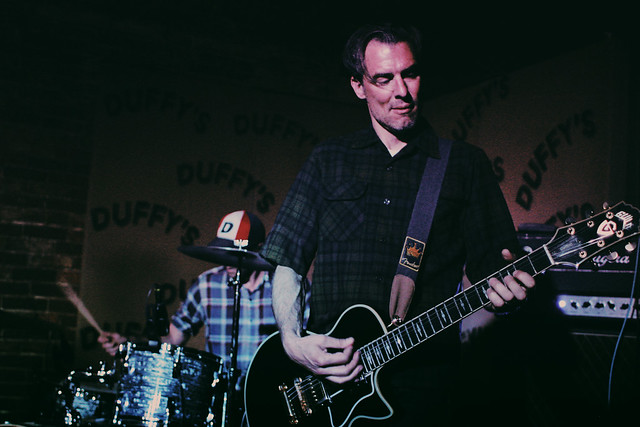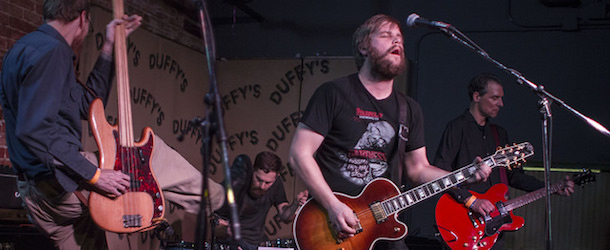words by Gabriella Martinez-Garro | photo by Michael Todd
At the second Hear Lincoln set of 2014 on Friday, Red Cities promises punk rock, sheer volume and no apologies for it.
Red Cities is made up of four musicians with decades of experience, both in and outside of Nebraska, behind them. Eric Aspengren, the band’s bassist, has played in Lincoln groups, such as Quilt and Think, since the late ‘80s. Lead guitarist Matt Bokovoy has also been playing in bands since the ‘80s, including the Oklahoma-based Zombie vs. Shark.
Along with drummer Josh Leeker and guitarist/vocalist Byron Anway, they invoke a timeless, but not necessarily classic, rock ‘n roll sound. It's the kind of defiant rock that recalls Iggy Pop and the Sex Pistols with a familiar punk theme of deconstructing the social norm, something that can be found both on their EP Build It Up, Tear It Down and its title track.
Red Cities is set to release their debut LP in September. On Friday, as the band plays its forthright rock ‘n roll amidst white collar workers and purveyors of local music, their jolting punk may force its way into the brains of anyone within earshot. Below, guitartist Matt Bokovoy answers our Hear Lincoln 2014 questionnaire, touching on Red Cities' taste for volume, the subsequent necessity for ear plugs and their musical sharp edges. RSVP for the show here.
Hear Nebraska: What was your first public show in Lincoln, how did it go? How are you different now?
Red Cities: We played our bass player Eric Aspengren's birthday party gig at The Zoo Bar as our first show. It went pretty well, but it was hard dialing in our sound on a stage, after practicing for seven months in a tiny basement. Good response, but we were pretty stiff.
We finally dialed in our sound with some different gear we have, and we're more loose and unpredictable on stage. In our scene of garage rock, you can't predict what we'll do in our live shows, it becomes unconscious to us, so we put the danger back into rock and roll that's disappeared for about 20 to 25 years after the corporate takeover of punk, garage rock and rock and roll. That was noted in the Journal Star when we played Lincoln Exposed this year.
HN: What’s your earliest musical memory?
RC: Well, some of us remember taking piano or guitar lessons, or doing the flutophone or choir in grade school. Eric and Matt are the oldest, so ‘70s rock and late ‘70s/early ‘80s punk were big influences. Byron and Josh have ‘90s and 2000s rock influences, in addition to the typical classic rock influences. Speaking for myself [Matt], my first concert experience was seeing The UK Subs, Powertrip (Jeff Dahl's band), Flipper and the Minutemen at the Adams Avenue Theater in San Diego in 1980.
HN: What do you anticipate the experience of playing such a non-traditional venue to such a non-traditional audience will be like for you?
RC: Most of us began in underground punk music when there were no traditional venues, so we are always in favor of playing non-club gigs. For Matt and Eric, that meant DIY punk shows in the early 1980s to early 1990s. Byron and Josh began as hired on musicians in Christian rock bands, and no clubs would book those bands, it was all a church-circuit youth scene. So actually playing clubs is relatively new to all of us. We grew up in music scenes that were shunned by commercialism, and if you didn't organize shows with people in those scenes, there would be no shows, and hence, no scene.

photo by Kat Buchanan
HN: What’s your best pitch for the people of downtown Lincoln weekday crowd that wouldn’t typically go see your band?
RC: Anywhere you plan to see us, you're still going to want some earplugs. So have some. They're free when you buy a record, and of course, you'll want a record.
HN: Do you think there is a disconnect between Lincoln’s creative community and business community? Why or why not? If so, do you see a solution? With that in mind, how do you think Hear Lincoln plays a role?
RC: In Lincoln, and elsewhere, it seems the creative community is turning into the business community, more so on the local and regional level. We're big proponents for all things local, be it the other local musicians we play with and see, or local businesses. With that in mind, Hear Nebraska can continue to support local/regional musicians, and local businesses. Buy our record.
HN: If you could (metaphorically) toss one of your songs into the window of a car on its way out of town on O Street, which one and why?
RC: Hard to pick just one. However, in September you can literally buy our 12" LP recorded and engineered by the fine people over at Fuse Studios, Charlie Johnson and Tim Kechely. This is a huge advantage, because you can then listen to it whenever you want.
HN: What lunch is the best lunch to eat to your music? As in, what should people bring to your Friday show?
RC: Our set is not for the complacent or the satiated. Come hungry.

photo by Bridget McQuillan
HN: What’s one piece of constructive criticism you think has helped you in the time you’ve been playing/writing music?
RC: I was advised to be generous with myself. When I started, I thought I was writing songs, but I've come to understand that I was learning a songwriting process. That the product isn't the song, but the skill set to write better songs.
HN: Rep one other song by a Nebraska artists we should all add to our personal rotations.
RC: "SEXAPHONE" by Thirst Things First, it's the title track from their recently released EP of that same name. This EP makes me [Matt] smarter as a producer of creative content and I can't get it out of my head. I love it.
HN: Why do you want to play Hear Lincoln?
RC: It would be cool to play outside during the day and to play downtown. We also never turn down playing a show, anywhere or with any band, that asks us to play. We have no image planning, or care where and when we play. That's the punk rock way, egalitarian.
HN: Best case scenario, what do you think Lincoln’s downtown weekday-business crowd will think of your performance?
RC: We play loud and fast, it's punk and garage rock, with some left-wing content, so those people that dig that, will like the show. Those that don't see the show will call the police to file a noise complaint, as we're known to hit 110 dbs at some of our shows.
HN: Do you see this kind of event as particularly important for Lincoln? Why?
RC: It is super important to have arts, music and culture public programming in any city, since these things enrich our lives in ways that cannot be quantified and it brings people together from different walks of life, and challenges our beliefs and develops our empathy for different communities.
Gabriella Martinez-Garro is a Hear Nebraska editorial intern. Reach her at gabriellamg@hearnebraska.org.




